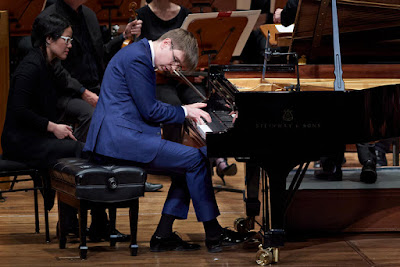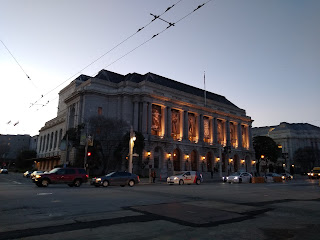Esa-Pekka Salonen
Photo by Minna Hatinen, courtesy of San Francisco Symphony
To San Francisco Symphony last night for the next-to-last program of the 2021-22 season, one I'd looked forward to for months, because there was the Bartók Piano Concerto No. 1, which I could
not remember have heard live, and which is a great favorite of mine. As it turned out, SFS hadn't played it since 1994, back in the Blomsted era, which surprised the hell out of me. I think that I heard Yuja Wang play the 2nd concerto in 2011 and I know that I've heard the 3rd live a couple of times, once with Hélène Grimaud, once in NYC with Radu Lupu and Cincy.
ANYWAY. The soloist was Pierre-Laurent Aimard, a formidable pianist in 20th and 21st century music and a player of great technical skill, the conductor was Esa-Pekka Salonen, and so I had high hopes.
Well, um. I was not happy with what I heard. From row T, the piano-orchestra balance was poor, with the piano disappearing under the riotous orchestra. Overall I thought it sounded under-rehearsed, with tricky tempo changes sounding not quite worked out and a general air of can-we-get-through-this. I have never seen Aimard before, and maybe he always plays with the score, but that was a surprise to me. The whole thing sounded rickety and lacking in confidence. They're doing the 3rd concerto tonight and tomorrow, and the concertos are being recorded as part of a big Bartók recording project, so there will be additional chances to check my impressions against the regular Tuesday night broadcast and the eventual recording. (And maybe this means that we'll get Bluebeard's Castle, cancelled in the pandemic, in a future season.)
The rest of the program was played magnificently. Jessie Montgomery's Strum led off the second half of the program, and it's a lovely piece. I heard it last year at Berkeley Symphony as well; it is getting lots of play, I think. The first work on the program, before the concerto, was Luciano Berio's reworking of a piece by Boccherini, and like all Berio, it was wonderful and quirky, and why isn't there Berio on every damn program, dammit. He was such a fine composer.
The closer was Respighi's Pines of Rome, and I tell you, this was not a work I would have guessed Salonen would program. What do I know? Maybe he was advised to put something popular on the program to balance out the Bartók, but I also saw a tweet last night from someone who saw him conduct it in LA, so I'm guessing it was his idea. Respighi doesn't have the world's best reputation as a composer, and it was definitely a backhanded compliment when a conductor, discussing great conductors of the past (dead, that is), called Arturo Toscanini "the world's greatest Respighi conductor." I mean, it's probably true but it's also ridiculous to put that first among Toscanini's achievements. He was immensely important to the profession of conducting and was both admired and respected by conductors who came in ahead of him in the living conductor's ranking.
Now, Pines is a monster of sorts, requiring a gigantic orchestra with everything but the kitchen sink. Respighi studied with Rimsky-Korsakov and clearly took away some ideas about orchestration of the splashy variety. (Spoiler: Rimsky was better at this and so was that Stravinsky guy who studied with him.) There's a celesta, there's a piano, there's an organ though it doesn't do anything beyond playing a pedal point. There's a recorded nightingale. (YES REALLY.) There's a big offstage solo for the principal trumpet and there's a clutch of extra brass. Thursday night I gather that the extra players were up in the balcony, but Friday they were in the audience-left Terrace. Do I ever feel sorry for the folks sitting there, who unexpectedly had half a marching band blasting away right at the back of their heads during the last section of Pines.
You might not have heard Pines, but you would recognize it anyway: it is a prime source of 1930s and 1940s movie music, oh, probably into the 1950s. It is....not subtle, and in fact, it hits you over the head. The opening movement made me think of Liszt's piano piece Les jeux d'eaux à la Villa d'Este. I'm guessing that there are fountains at the Villa Borghese too. The second, "Pines Near a Catacomb," is extremely beautiful and atmospheric. The third put principal clarinetist Carey Bell right up front, and you know, he is just so very good that I always want to hear him play. He can make anything sound like the greatest music ever composed.
The last movement is...well...Roman soldiers marching on the Appian Way. In his review, Joshua Kosman called this protofascist, and he is not wrong. Still, it is spectacular in its way, even though Respighi uses what I can only call the most obvious of gambits to generate harmonic excitement, sliding the harmonies up a half-step again and again and again. I was about ready to roll on the floor laughing, and I'm sure that Rimsky rolls over in his grave every time an orchestra plays Pines, meaning that he is truly worn to a frazzle by now. "Pines of the Appian Way" is an elemental pleasure; it's loud and exciting and you don't have to think about it all that much when you hear a great orchestra playing it, even though, like Joshua Kosman, you probably should think about it.
















